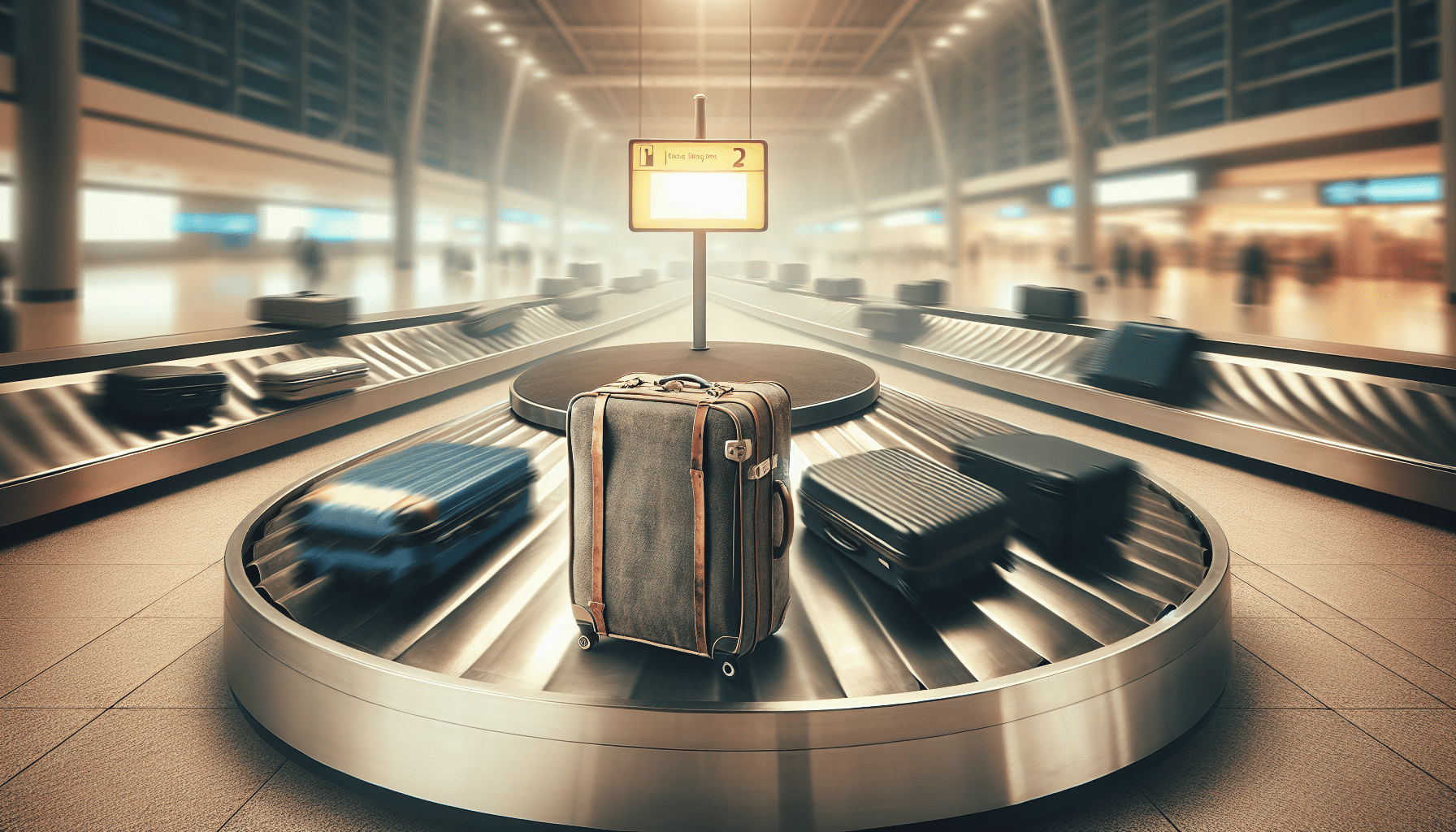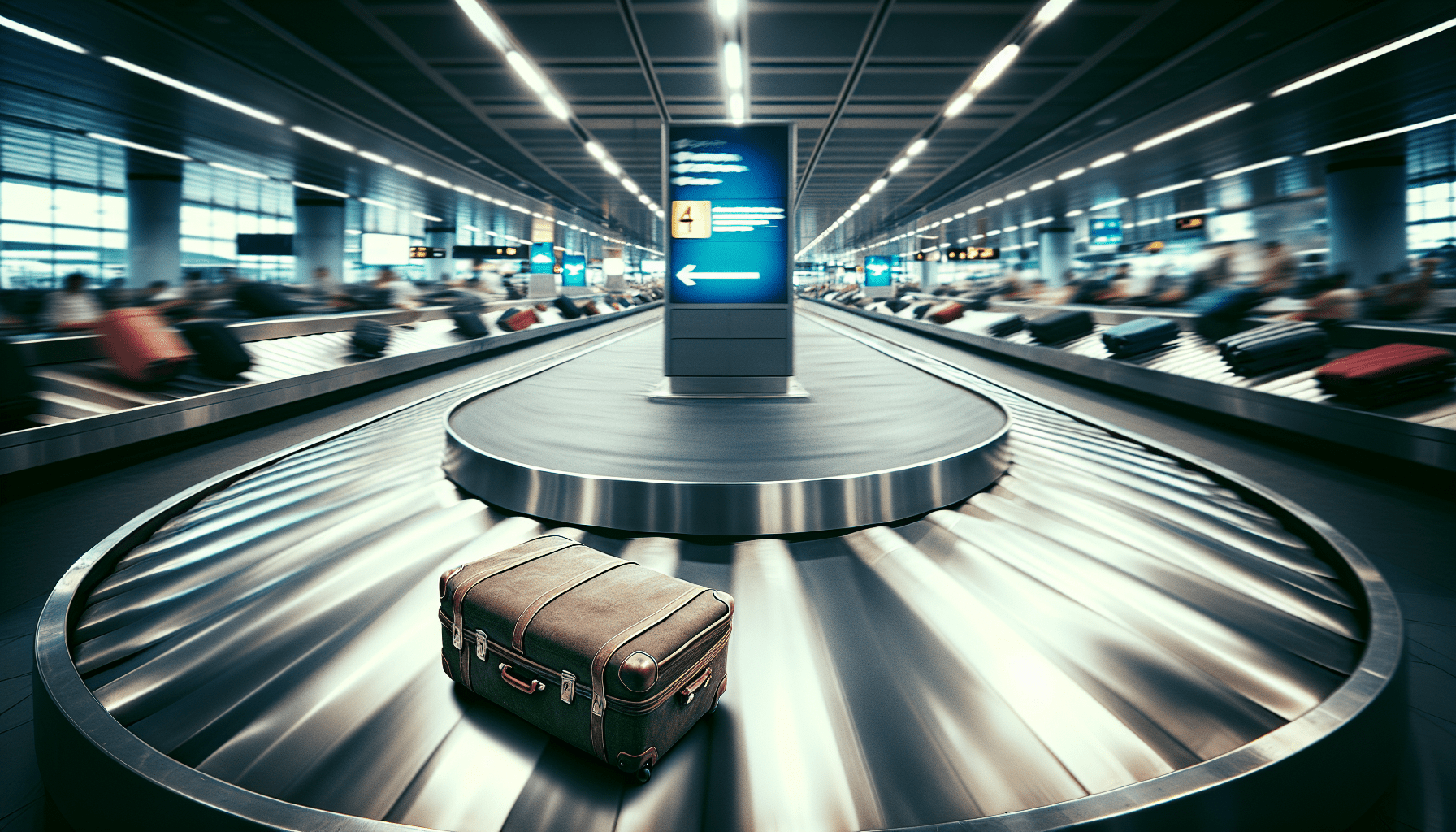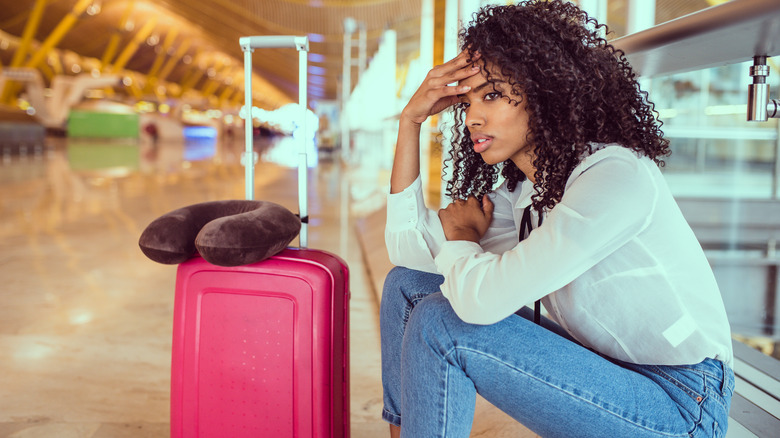Under Armour Unisex-Adult Undeniable 5.0 Duffle, (014) Halo Gray/Provence Purple/Castlerock, Medium
$26.60 (as of November 20, 2024 15:23 GMT +00:00 - More infoProduct prices and availability are accurate as of the date/time indicated and are subject to change. Any price and availability information displayed on [relevant Amazon Site(s), as applicable] at the time of purchase will apply to the purchase of this product.)Have you ever wondered what happens to all the bags at the airport? Most of us tend to think of our luggage as faithful travel companions that stick with us through various flights and connections. But what if I told you there’s a whole world of bags traveling without their owners? This phenomenon is called “ghost bagging,” and it could impact you more than you think.

Shop These Accessories for a Comfortable Trip
What Exactly is Ghost Bagging?
Ghost bagging happens when a piece of luggage is checked onto a flight, but the person who checked it doesn’t actually board the same aircraft. Sometimes this happens by accident, like when a bag is mistakenly loaded onto the wrong connecting flight. Other times, it’s done deliberately, often for nefarious reasons.
How Does Ghost Bagging Occur?
Imagine you’re at the airport, checking in your luggage. You’ve got your boarding pass, your passport, and that classic pre-flight jitters. Once your suitcase rolls away on the conveyor belt, you’re good to go, right? But then you suddenly decide not to board your flight or circumstance forces you to miss it. In some fortunate cases, the bag system catches this mismatch. However, in others, your bag might still make it to its intended destination, creating a “ghost bag.”
Here’s a quick breakdown:
| Situation | Outcome |
|---|---|
| Accidental ghost bag | Bag gets mistakenly loaded onto the wrong flight. |
| Deliberate ghost bag | Bag is intentionally checked in by someone who has no plans to board the flight themselves. |
| Cargo services | Airlines sometimes offer these, but ghost bagging isn’t encouraged or allowed by most airlines. |
Why Should You Care?
You might think, “Why should this concern me?” Well, imagine standing at baggage claim, eagerly waiting for your suitcase after a long flight. Somewhere in that sea of luggage, there’s an unclaimed bag loaded with who-knows-what. That mystery bag could contain anything from illegal drugs to dangerous items, making it a hotspot for potential criminal activity.
A Blast from the Past: The Pan Am Flight 103
To understand the potential dangers, let’s take a chilling walk down memory lane to 1988, when Pan American Flight 103 tragically exploded over Lockerbie, Scotland. The NYC-bound flight was brought down by a bomb placed in a ghost bag. The terrorists who orchestrated this tragedy never boarded the plane—they only checked in a suitcase carrying the timed bomb. This horrifying event resulted in the death of 270 people.
Security Measures Then and Now
Since then, airport security has evolved by leaps and bounds. Agencies like TSA now screen checked baggage for explosives and other dangerous items to prevent such tragedies from repeating. While these security measures have significantly improved, ghost bagging remains a concern for its potential use in transporting illegal goods.
Modern Examples of Ghost Bagging
Yes, ghost bagging still happens today. In 2023, three women at Nashville International Airport were accused of engaging in a ghost bagging operation. Their goal? To profit off stolen property. These women were caught trying to collect a ghost bag containing new Lululemon clothes, fake IDs, and a credit card, ostensibly to return the stolen goods for cash or gift cards. This method of fraud highlights another way ghost bagging can impact everyday travelers like you.
A Typical Scenario
To paint a clearer picture, let’s break down their scheme:
- Shopping with Stolen Funds: The culprits purchase high-value items using fraudulent credit cards.
- Checking in the Ghost Bag: They check in a suitcase stuffed with these items, complete with a fake ID and a detailed purchase receipt.
- Pick-Up Point: Someone else retrieves the ghost bag at the destination airport, aiming to return the items for cash or store credit.
This example showcases how sophisticated some ghost bagging operations can be.

Shop These Accessories for a Comfortable Trip
Why Do Airlines Allow This?
Well, technically, they don’t. Most airlines have policies against transporting unattended bags on passenger flights. For example, Delta offers cargo shipping services explicitly designed for sending items without a passenger. Southwest Airlines, whose flight was involved in the Lululemon case, states in its Contract of Carriage that it only accepts baggage for transportation on flights where the passenger is transported.
The Main Loophole: Domestic vs. International Flights
Here’s where things get tricky:
| Type of Flight | Bag Matching Requirement |
|---|---|
| Domestic Flights | Not always required; only TSA screening. |
| International Flights | Mandatory; unboarded bags are removed. |
Airlines sometimes miss out on confirming that every checked bag corresponds to a boarded passenger, especially on domestic routes. While international flights require bag matching—if you don’t board, your luggage doesn’t either—domestic flights mainly rely on TSA screenings for security.
What Can You Do?
Now that you’re aware of ghost bagging, you might be wondering how you can protect yourself and your belongings. Here are five tips to make your journey a little less nerve-wracking:
1. Stay Close to Your Luggage at Baggage Claim
Always beat the rush at baggage claim. Your swift appearance lessens the chance of anyone mistakenly or intentionally grabbing your bag. Eye your luggage carousel like a hawk and claim your bag as soon as you spot it.
2. Mark Your Bags
You don’t need to paint your suitcase in neon colors, but some distinctive marks can help. Bright luggage tags, ribbons, or even unique stickers can deter someone from snatching your bag “accidentally.”
3. Be Vigilant About Others’ Bags
Ever notice an unclaimed bag doing laps around the carousel? While it might be tempting to ignore it, that’s sometimes how contraband stays under the radar. Report any suspicious or unclaimed luggage to airport authorities.
4. Avoid Placing High-Value Items in Checked Baggage
It’s a no-brainer but it can’t be overstated: always pack your valuables in your carry-on. If you’re wary of ghost bagging or airlines losing your luggage, keep anything you can’t afford to lose close to you.
5. Confirm Flight Details and Bag Tags
Before you leave the check-in counter, double-check that your baggage is tied to you and your exact flight details. If anything feels off, alert the airline staff immediately.
Global Perspective on Ghost Bagging
Ghost bagging isn’t just a concern for your local airport; it’s a global issue. International flights have stringent rules for a good reason. If a passenger doesn’t board, neither does their bag. This rule helps to alleviate some of the risks associated with ghost bagging.
Comparison of Airport Security Measures
| Region | Security Measure |
|---|---|
| USA | TSA screen for explosives, bag matching mainly on international flights. |
| Europe | Strict EU laws requiring bag-passenger matching on all flights. |
| Asia | Intensive screening protocols but varied implementation across countries. |
In Europe, strict EU laws require bag-passenger matching on every flight, significantly reducing instances of ghost bagging. Asia’s protocols are robust but can differ depending on the country.
These varying security measures mean that your risk level can change depending on your destination.
The Tightrope of Convenience and Security
One reason airlines might be lax on confirming whether every checked bag has a corresponding passenger is the balance between convenience and security. Air travel thrives on efficiency. The minute you add another layer of security checks, it can significantly slow down the entire system. But this balance often leaves the door slightly ajar for issues like ghost bagging to creep in.
Bulk vs. Individual Screening
Luggage screening en masse accelerates the process, but it sometimes sacrifices individual scrutiny. TSA employs advanced technology to screen numerous bags quickly, but there’s always room for potential oversight.
False Alarms and Delays
increased scrutiny means more checks, potentially leading to false alarms and delays, much to the ire of time-sensitive travelers. You may have noticed long lines and intensive questioning can sometimes irritate those already on edge about their flights. Balancing convenience with the necessity for a thorough security check remains an ongoing challenge.
How Could Ghost Bagging Impact the Economy?
The subject of ghost bagging might seem confined to your suitcase and the baggage claim, but it also has wider implications for the economy:
Increased Security Measures
Higher instances of ghost bagging could push airlines to adopt stricter security protocols, resulting in higher operational costs. Guess who’s bound to absorb these costs? You got it, the passengers.
Insurance Premiums
Increased risk means heightened insurance premiums for airlines, which could trickle down to fare increases for travelers. Additionally, frequent theft or fraud could drive up costs for consumer goods, as companies adjust their pricing strategies to recoup losses.
Traveler Confidence
Frequent news of ghost bagging incidents can shake traveler confidence, discouraging people from flying. The resultant dip in air travel can impact tourism, causing economic ripples far beyond the baggage claim area.
Conclusion: What Can We Expect for the Future?
As technology advances and airline security systems become even more sophisticated, the fight against ghost bagging will undoubtedly intensify. Airlines, travelers, and authorities must unite in their vigilance to ensure that bags and their owners stay united in flight.
What’s Next?
Future advancements might include more advanced scanning technologies and, perhaps, more rigorous checks at bag drop and pick-up points. Enhanced coordination between airlines and security agencies globally will also play a significant role in mitigating potential risks.
Until then, your awareness and vigilance are your best defenses against becoming an unintended party in a ghost-bagging situation.
Feel better equipped to handle your next airport journey? Keep these tips in mind, and you’ll be well-prepared to navigate the world of checked luggage with confidence and caution. Safe travels!
Shop These Accessories for a Comfortable Trip






